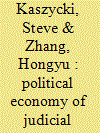| Srl | Item |
| 1 |
ID:
179269


|
|
|
|
|
| Summary/Abstract |
Many democracies start with aspirations to rectify wrongs that occurred under the preceding authoritarian regime. To what extent can a new democracy address political repression and violence by dictators, given that key actors from the past often remain politically powerful? What determines the success of those efforts? We construct and analyze a novel data set on 102 retrials of allegedly fabricated espionage cases in South Korea to explain the political conditions under which a democratic judiciary reverses past errors. We find that the time since democratization, a leader’s policy drive for transitional justice, and the degree of fabrication in the past all affect retrial acquittal rates. We also find that judges who were appointed under the authoritarian regime are less likely to nullify past verdicts. Furthermore, national survey analysis suggests that the overturning of past fabricated verdicts significantly enhances citizens’ overall trust in the judiciary.
|
|
|
|
|
|
|
|
|
|
|
|
|
|
|
|
| 2 |
ID:
152345


|
|
|
|
|
| Summary/Abstract |
Like other developing countries, China has been struggling with corruption. Judicial corruption, in particular, damages the rule of law and presents a market disruption as an outcome of a lack of commitment by the government regarding property rights. This article seeks to explain the variations in judicial corruption within China, and it develops a theory of city-level corruption of judges. The theory is tested by an empirical study with data from the World Bank corruption survey using a Bayesian spatial linear model. While wealth appears to diminish corruption, there is also a strong spatial relationship with regard to the level of judicial corruption in China, indicating that as some regions become less corrupt, surrounding areas also experience a diminution in corruption. Thus, through a process organic to the current regime, China could experience an increase in judicial trustworthiness.
|
|
|
|
|
|
|
|
|
|
|
|
|
|
|
|